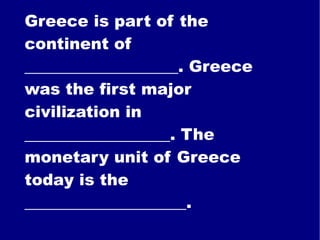
review
- 1. Greece is part of the continent of ___________________. Greece was the first major civilization in __________________. The monetary unit of Greece today is the ____________________.
- 2. Greece is a series of _______________ and ____________________, making it difficult for people in ancient times to be unified. The two seas that surround Greece are the _________________ and ______________.
- 3. The capital of Greece and its largest city is ______________. The largest mountain is _______________. Two countries that border Greece are ______________ and _______________.
- 4. The Greek flag is _______________ and white. The white stripes represent _____________________. The blue represents the ____________________.
- 5. The Greek ________________ emerged around 800 BC. The Greeks got their alphabet from the __________________. The Greek alphabet has _______ symbols. It was the first to include both ______________ and ________________.
- 6. During the bronze age, the earliest greek civilization, the _______________ lived on the island of ____________. They were named after their king, King __________. The Minoans built a huge palace at Knosses, under which the legendary _____________ was believed to live.
- 7. During the classic period, also called the _____________ Age of Greece, the Greek people were the major power in the _______________ Sea. _______________, ________________ and ________________ were three philosophers from Greece. ________________ invented geometry. The Greeks are probably best know for their political system, the very first __________________ government.
- 8. The Greeks held the first _____________________ in 776 B.C. There was only one event, the ________________, called the strade. The Greeks dedicated the games to their god __________. Each game began with the lighting of the __________________, which symbolized the death and rebirth of _______________
- 9. The Greek gods were all related and ruled after overthrowing the ________________. The twelve most powerful greek gods were the ___________________. The supreme ruler was ________________. These gods lived on ______________________.
- 10. The greeks lived in isolated ________________________ and were often quarreling with each other. _______________was a city-state that had a very militaristic society. The Greek conqueror, ______________________ set out to unify the world, taking his army all over the globe.
- 11. According to legend, Rome was named after ________________, who ruled Rome for ____________ years. He murdered his twin ____________ because he ____________ him. Their father was ______________. Rome was built on _____________ hills.
- 12. Before the Roman Republic, the ____________ ruled Rome. The Roman Republic was established around __________ BC. The Roman Republic ended with the reign of ____________________, the emperor at the time of the birth of Christ.
- 13. The ruling class in Rome was called the ________________. The commoners were called _________________. Roman law was written on ______________ tablets. A dictator could only hold power for __________ months under Roman law. _____________ was murdered by the Senate because they feared his power and popularity.
- 14. All _______________ could vote and become consuls. The people who made laws in the Roman Republic were the ____________________.
- 15. The uprising by the Roman slave ___________ lasted for three years. Spartacus was trained to be a ________________. _____________ finally defeated Spartacus. The _____________ were used to symbolize Rome's power and jurisdiction. 6000 of Spartacus' men were ____________ by Crassus.
- 16. The Roman emperor ____________ was born in Spain. He was adopted by the emperor ________________. He was able to ______________the territory of Rome the farthest. After Trajan ______________ became emperor.
- 17. Hadrian was part of the group of five emperors called the _______ emperors. ________________ was 80 miles coast to coast across ________________. Hadrian built the ______________ to honor all the gods.
- 18. After Rome fell, Europe entered into the period of times called the _________________ Ages or the ________________ Period. Europeans lived on large _______________ estates. Each manor was ruled by a ____________. The people who lived and worked the land were called ______________. The one unifying force in Europe was the ___________ church. For this reason, Europe was sometimes called ______________.
- 19. In 1095, the ____________ ordered christians to go to the east and recapture the ________________ from the _______________. These series of wars were called the _______________. As a result of this travel, Europeans began to trade again. A new middle class formed, called ________________. Many _____________ grew larger in Europe as merchants and middle class people moved into them. The invention of the _____________ in Germany helped the spread of ideas.
- 20. The Enlightenment took place in the _____________ and _____________ centuries. Another name for the Enlightenment was the Age of _____________.
- 21. The Greek Astronomer ________________ theorized that the ___________ was the center of the universe. This is called ___________________________ _____________ challenged this idea with his theory of ________________.
- 22. The Italian astronomer, ______________ built a telescope with magnification of 20. He was _________________ by the catholic church for his ideas. The year Galileo died was the same year that ______________ was born, the father of modern physics.
- 23. Newton's ___________ laws of motion make up the fundamental principles of modern physics. The first law states that ___________________ The second law states that ____________________ The Third law states that ______________________. The fact that I can lean against the wall without falling is explained by Newton's ______________ law.
- 24. French thinkers, called ______________ spread ideas about society and government. Thomas Hobbes, from _____________, thought that people need _____________ government because they were ________________. ________________ believed that government should be divided into three branches. This concept is called __________________.
- 25. ______________ believed in a social contract between people and government. He also believed there were ________________ of ____________, ______________ and _______________. Trenchard and Gordon wrote ____________, which were read in the colonies. They promoted the idea that people have a ____________ to rebel against government that is unfair or too powerful. Russeau believed that people were basically ___________ and the best government would be a ______________.